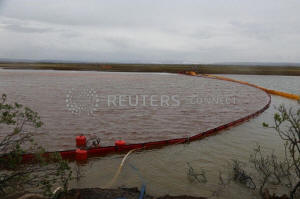|
A
vast fuel tank lost pressure on May 29 and unleashed 21,000
tonnes of diesel into rivers and subsoil near the city of
Norilsk, an incident that Greenpeace has compared to the
devastating 1989 Exxon Valdez oil spill off Alaska.
"Russia has not yet had experience of clearing up such vast
pollution from bodies of water as far as I understand," Putin
told officials on state television.
It will take at least 10 years for biodiversity in the waters to
fully return where the accident happened, the state fishing
agency said at the meeting.
The state environmental watchdog plans to finish its assessment
of the damage by July 1, its head told Putin.
Vladimir Chuprov, a Greenpeace activist, said the damage to the
water totalled 100 billion roubles ($1.44 billion), a figure
that was higher than it should be because of what he said was
the slow official response, the TASS news agency reported.
The city of Norilsk is home to mining giant Norilsk Nickel <GMKN.MM>.
The company and emergency specialists are collecting
contaminated soil and fuel from local rivers into containers.
Nornickel has already spent 5 billion roubles on the clean-up,
its co-owner Vladimir Potanin said. The mining giant also plans
to spend 13.5 billion roubles on safety checks for its remaining
fuel storage tanks in 2020-2021.
More than 90% of the fuel from the rivers and about 70% of the
contaminated soil have been already collected, Nornickel said
earlier this week.
Putin previously ordered officials to check all similar fuel
storages in Russia, and they plan to complete this process by
July 24, they told him.
($1 = 69.3359 roubles)
(Reporting by Polina Devitt and Anastasia Lyrchikova; Writing by
Tom Balmforth and Polina Devitt; Editing by Mark Heinrich)
[© 2020 Thomson Reuters. All rights
reserved.] Copyright 2020 Reuters. All rights reserved. This material may not be published,
broadcast, rewritten or redistributed.
Thompson Reuters is solely responsible for this content.

|
|






